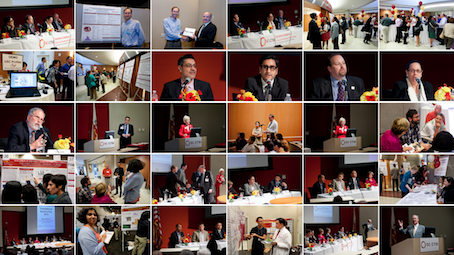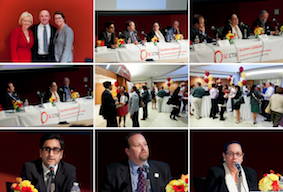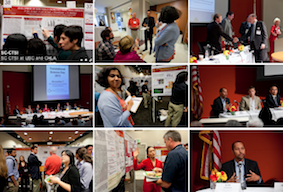Hundreds Gather For First Annual Translational Science Day At USC Hosted By SC CTSI
Members of the USC and CHLA research communities, along with community leaders and industry representatives, gathered to discuss the challenges of translation in an academic environment.
“It was great to see people from all corners of the translational spectrum represented in one room,” said Thomas Buchanan, director of the SC CTSI. “It gave us a unique opportunity to gain collective insights about the state of translation at USC that we otherwise wouldn’t be able to.”
The first annual Translational Science Day, hosted by the Southern California Clinical and Translational Science Institute (SC CTSI) on November 7, 2012, offered an opportunity for more than 200 members of the USC and Children’s Hospital of Los Angeles (CHLA) research communities, along with community leaders and industry representatives, to exchange ideas.

The event kicked off with opening remarks by USC Vice President of Research Randolph Hall, who set the stage by highlighting USC’s current research priorities and the university’s goal to build its stature in medical research.
“Building our capacity for clinical and translational research at USC is vital. This event brought together key internal and external stakeholders who participate in translational research every day,” said Hall.
“You’ve got to have a passion. You’ve got to get something to get you out of bed every day to say 'I really want to do this,'” said morning keynote speaker Craig Jordan from Georgetown University, who captivated the audience with an inspirational presentation on his translational work developing tamoxifen—an anti-cancer treatment credited with saving the lives of over one million women worldwide.

“If you’re going to do this [research], check your ego at the door, because this is… really about service; and it’s about serving,” said afternoon keynote speaker Lloyd Michener from Duke University, who challenged attendees to recall the purpose and spirit of translational research. He shared his pioneering work redesigning health care to improve community health outcomes, and innovatively decreasing health care costs by transforming health care delivery systems through teams, community engagement, and practice redesign.
Both keynote speakers led provocative and motivational discussions with panelists representing the full spectrum of translation.
“Don’t be afraid to say yes to challenges. Just because it’s hard, or perhaps a little bit out of your range of expertise, does not mean that you should be discouraged from pursuing things in a way that really advances our mission to advance our science into patients,” said morning panelist Stephen Gruber, director of the USC Norris Cancer Center.
“If we’re going to be successful… our partnerships have to extend far beyond just the work that we’re going to do inside our care delivery system, and that’s where, for sure, the SC CTSI and people with initiative from USC and other places can really play an enormous role in bringing partners together. Today is an example of that,” said Anish Mahajan from the Los Angeles County Department of Health Services.

For many, the event also offered an opportunity to better understand the wide range of activities the SC CTSI is involved in to facilitate partnerships with the community and support the research and careers of faculty members at USC.
“Events like these are what keep a culture of research alive at an academic institution,” said Michele Kipke, Vice Chair for Research, Department of Pediatrics at CHLA. It was important for me to hear what the university’s priorities are and how we all might work together to have meaningful impact.”
The original story was published on KECK.USC.edu



